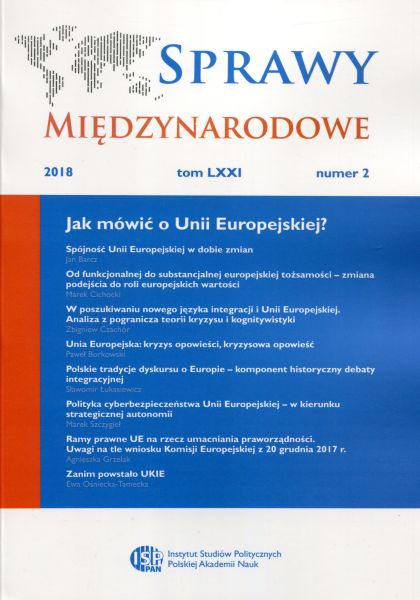W poszukiwaniu nowego języka integracji i Unii Europejskiej. Analiza z pogranicza teorii kryzysu i kognitywistyki
Searching for a New Language of Integration and the European Union: Analysis from the Border of the Theory of Crisis and Cognitivism
Author(s): Zbigniew D. CzachórSubject(s): EU-Accession / EU-DEvelopment
Published by: Instytut Studiów Politycznych PAN
Keywords: the language of integration and the European Union; cognitive science (cognitivism); crisis, optimism; pessimism; cognitive dissonance; the system of integration and the European Union; reality
Summary/Abstract: This article is about the process of searching for a new language of integration and the European Union using the analysis from the borderline of the crisis theory and the concept of cognitivism. This search is associated with the effects of a multidimensional crisis in which the EU has been for over 10 years. During this time there have been many changes in the system of European integration. These changes are analyzed here in three overlapping perspectives used by researchers, analysts and journalists, but also politicians and officials (national and EU). The first is connected with an attempt to investigate and explain crises. The second perspective is based on a diagnosis using language, a language that these crises consolidate and strengthen (reproduce). And the third, which concerns the application of the language of denial, rejection, trivialisation and marginalization of existing systemic disturbances and anomalies in the EU. Naturally, all these perspectives are also present in this article. For the author of the text language is a condition for the existence of integration and the European Union. It becomes a real and symbolic guide to the European Union, as well as its impact on the EU, but it also shapes and changes it in its system. The linguistic image of the European Union is always an intentional image, created and valued. The author also points out in the article that the integration crises also triggers a variety of semantic manipulations, through which we understand any actions on the language as a code that directly affect the implementation of the radical or post-ideology language properties. This language is offered to us by all those who want to tell us today how to build a new European order.
Journal: Sprawy Międzynarodowe
- Issue Year: 71/2018
- Issue No: 2
- Page Range: 59-84
- Page Count: 26
- Language: Polish

